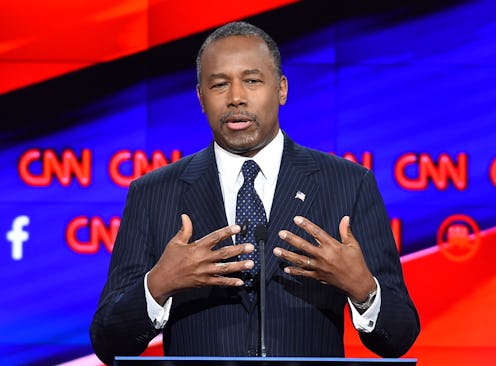Tuesday night marked the last GOP debate of 2015, and there are only two more to go before Iowa's primary on Feb. 1. Therefore, this was an extremely critical moment for the candidates to set themselves apart from the rest and advance on frontrunner Donald Trump. Ultimately, Ben Carson ultimately lost the debate. In the wake of attacks in Paris, Beirut, and San Bernardino, national security was an increasingly contentious cause of disagreement between the candidates. As a result, Tuesday night's debate on CNN heavily focused on national security and terrorism, and in the end, it was Carson who was unable to make strong arguments in these arenas.
Leading up to the debate, Trump was polling at a personal high of 38 percent of support in the most recent Washington Post / ABC News poll. His recent comments about banning all Muslims from entering the United States — coupled with attempts by many governors to turn away Syrian refugees — have generated numerous divisions among the candidates, as the majority of them denounce the GOP frontrunner. It was the perfect opportunity for them to take firm stances on terrorism, ISIS, and Syrian refugees, and to propose solutions to recent threats to national security. But not everyone was successful.
Carson was largely invisible during the first portion of the debate, and when it was finally his turn to speak, the first thing he did was complain about the lack of airtime he had received. Or cough over his competitors. As the debate progressed, Carson went down a slippery slope. He attributed much of what is wrong in America to "political correctness," and used this to justify increased surveillance of Muslims. He then refused to get involved in a discussion between Marco Rubio and Rand Paul, despite this being a debate in which all the candidates were asked about each other's stances on crucial issues. But his biggest mistake was to compare his career as a pediatric neurosurgeon — and, more explicitly, the removal of tumors from children's brains — to the ability to wage war as commander-in-chief:
Well, interestingly enough, you should see the eyes of some of those children when I say to them we're going to have to open your head up and take out this tumor. They're not happy about it, believe me. And they don't like me very much at that point. But later on, they love me. Sometimes you — I sound like him. You know, later on, you know, they really realize what's going on. And by the same token, you have to be able to look at the big picture and understand that it's actually merciful if you go ahead and finish the job, rather than death by 1,000 pricks.
It was abundantly clear that Carson could not hold his own in a foreign policy discussion. He made sweeping statements about the nature of warfare and putting boots on the ground to combat ISIS, but could not articulate specific policy proposals that he would put forward as president. His lack of experience in this particular arena forced him to make numerous questionable analogies to the medical field. He was correct in saying that being loud and boisterous are not necessarily indicators of being a good candidate, but his lack of charisma has been significantly impacting his position in the polls. Although Carson initially accelerated to second place, he has been sliding for some time now, and is currently tied for third place with Rubio, with 12 percent.
Carson did have his moments during the debate. His comments about Putin and economic dependency were relatively well-received, and he demonstrated that he did have some specific knowledge about the nuclear triad. But he said he was running on the principles of honesty and integrity, and if his West Point gaffe proved anything, it was that he does not always live up to these principles. And if Carson wants to avoid stumbling further in the polls, then he needs to speak more specifically about topics like foreign policy and the economy.
